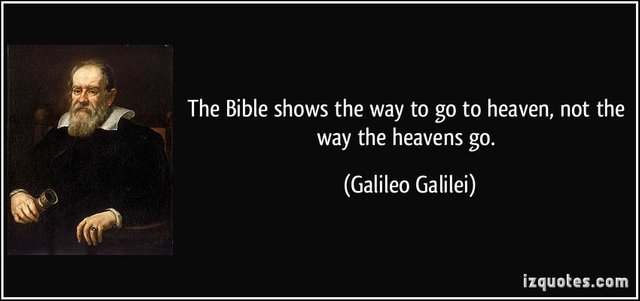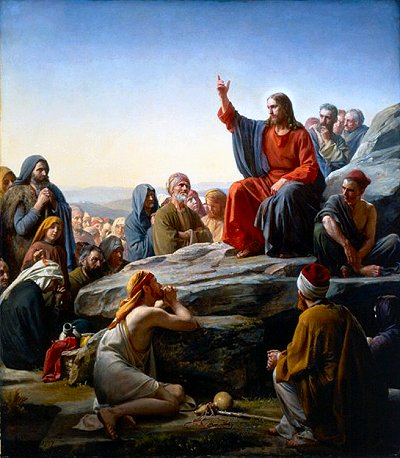Science and Religion: The How and Why of the Universe
The Universe seems to be able to take care of itself, from the Big Bang to the Rise of Humanity, and the Bible makes some pretty ridiculous claims. The earth is flat, immovable, and is the center of
everything. God made the earth in 6 earth days. Ancient people lived for hundreds of years, Vulcan style. The earth flooded and everything, even the highest mountain, was under water for over a year. People who died rose again. And a verse in Zechariah 2:6 seems to indicate the
reality of Santa Clause.
How can the two ideologies ever come to terms? What is truth?
Truth comes in different forms.
A friend of mine could show you exactly how to play the lute, a stringed instrument popular 400 years ago in Europe. He could show you the 12 courses of double strings, he could measure for you the length of the instrument. He could detail the lives of his favorite composers. He could play you a baroque tune and you could listen, maybe even enjoy it. These are all factual, but omit an important question: Why?
To play the lute well takes a hundredfold more effort than to play the electric guitar, a popular instrument of today. It takes hours of practice every day, and even though he is one of the best lute players in the United States, he has difficulty making a living with his music. Why does my friend bother to pursue this instrument?
If you have ever heard a lute sonata played by a virtuoso, you would not doubt why my friend puts forth the effort to play this magical instrument. It transcends ordinary experience. The music is so much more than just the length of the instrument or the number of strings.
Science and Religion ask separate, equally valid questions. How? and Why?
I think an issue both atheists and certain bible followers face is they forget:
The Bible was never intended as a scientific manual!

What, then, do we gain from the Bible? How are we to understand the passages that contradict modern scientific understnanding?
We get a clue from a scripture in Matthew 13:34-35, as Jesus speaks to ordinary people:
34 All these things spake Jesus unto the multitude in parables; and without a parable spake he not unto them:
35 That it might be fulfilled which was spoken by the prophet, saying, I will open my mouth in parables; I will utter things which have been kept secret from the foundation of the world.
In Mark 4: 11, 12, and 34 we read:
11 And he said unto them, Unto you it is given to know the mystery of the kingdom of God: but unto them that are without, all these things are done in parables:
12 That seeing they may see, and not perceive; and hearing they may hear, and not understand; lest at any time they should be converted, and their sins should be forgiven them.

Why did Jesus speak in parables? Parables are stories that are intended to be interpreted on a number of levels. On the surface, they are stories about every day life: farming, hiring out workers, losing sheep or coins. All things his listeners could relate to.
More deeply, they tell those that want to know more how the word of God works in
our hearts, and what effort God puts into trying to make us happy and loved. People understand exactly in proportion to what effort they pay attention.
Let's take the story of Creation as recorded in Genesis as an example. The Pentateuch, or first five books of the Old Testament, are reportedly recorded by Moses. There are controversies of actual
authorship, but for the purpose here, let's assume Moses recorded the Creation. Let's say that by some prophetic revelation and scientific reasoning, he understood completely about the Big Bang, the rise and fall of star systems, the pull of gravity around the newly formed sun to form the planets. Let's say he saw evolution, mass extinctions, and the rise of humans. He saw it all clearly.
How would he record it to an illiterate group of shepherds who knew nothing beyond their flocks?
How much would the knowledge, if any were able to grasp the tiniest part of it, help them live happy, productive lives?
Even if these people were able to grasp any of it, how would they pass on that knowledge to their children? Within a generation or so, the vastness of Creation would have been reduced to the story of God using his super God powers and snap the earth appeared in 6 days, dinosaur fossils and all.
This kind of scientific understanding would have been impossible three thousand years ago, before telescopes and modern mathematics. But people still needed to know about Laws and God's plan for his children. Religious belief held people together and helped to teach
people how to get along in a violent world.
Just as it is impossible to understand the lute without actually hearing music played, and seeing the virtuoso dance his fingers over the strings, I believe it is impossible to know all truth without seeking the Why, as well as the How.
There is not only room for Religion in the world of truth, but it is absolutely necessary to get a complete understanding of the way the Universe actually is.
How we humans got on earth can be answered in a science discussion. We
can talk about billions of years of gases coalescing, exploding stars, phases of Earth's history that contributed to evolution and the rise of humanity.
But Why are we here? Why did the Universe or God go through billions of years of planning and effort to create bodies for our spirits? That is the discussion for Sunday School.
Asking why and how gives us a more complete circle of truth to feed our souls. We can look up at night and marvel at the River of the Sky, and get a sense of our place, and the love God must have for us to put us here.
I believe He has a much grander plan for us in the eternities.

Good article. It's interesting insight and food for thought.
Beautifully written, especially the part about how the Bible was intended to be understood by everyone at every point in time. (And, I expect, not wanting to give away too much information we were supposed to find out for ourselves.)
That said, I'll point out that:
I'm gonna go with, that's exactly what happened. God built a 13.8B year old universe with dinosaurs and all the trimmings in the time it takes for 6 literal rotations of the earth.
Thanks for reading!
I believe Moses really did write Genesis, I just mentioned the controversy because some historians like to argue about it.
As far as how long it took God to make the earth... we will have to disagree on that. I believe God lives outside of time, so wouldn't measure his time by earth days. I think there is a lot more to what God does and is than can possibly be recorded on paper for us to understand, so while I read and follow the Bible, I feel it contains only a small percentage of God's truth. The point in the Ten Commandments where it says God created the earth in 6 days and rested on the seventh... well, it could be there to remind us that we need to take a break, too, and devote some time to worship. No excuses of being too busy. It doesn't necessarily have to be interpreted as 6 earth days (since on several of those days, there was no sun for the earth to orbit, and no solid earth to spin). Could it be 6 God days?
Anyway, I love your replies, they definitely help me think! Keep reading and commenting!
Look me up after the Lord returns and we'll go ask Him. :o)
He did say "It was evening and it was morning, the first day".
Lol. Since there was no earth yet, it COULD be in His time frame.
This is all insignificant compared to the power of the force.
Lol, I guess there is a third part of the circle I neglected!
I feel like everything if up for question but why do we people bother with such unimportant things and theories that don't help us at all?
Question: Why am I here?
Answer: Because my parents had sex.
Question: How am I here?
Answer: By birth, physically. Else i don't know.
Question: What is my purpose here?
Answer: To live up to my potential.
End of story
I just feel good if I'm productive while bringing help, happiness, and love to others, everything else is unimportant.